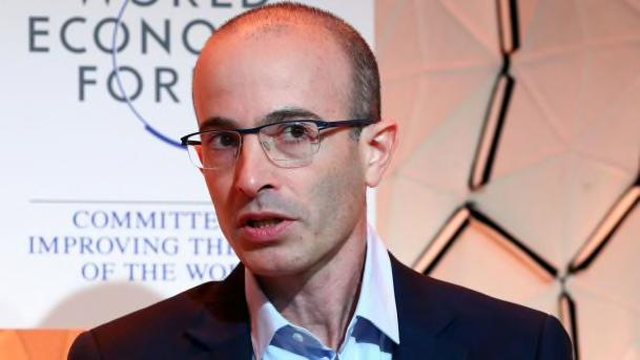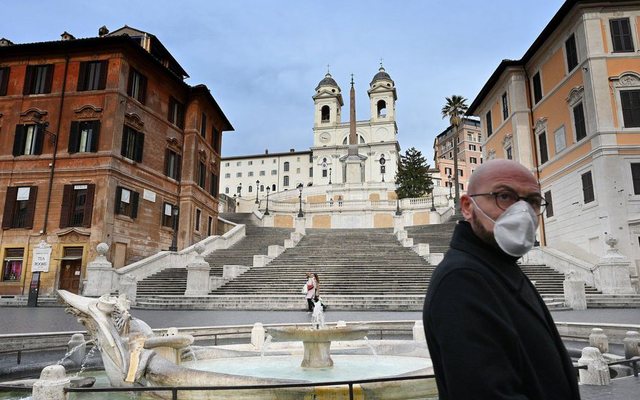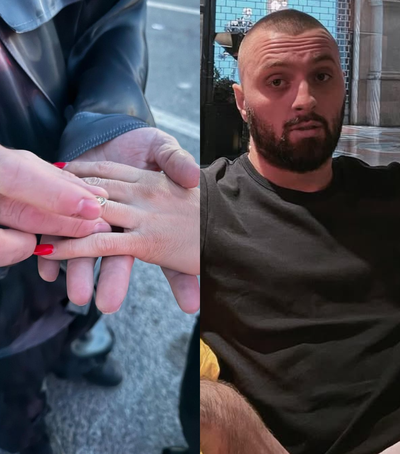
Humanity is facing a global crisis. Probably with the biggest crisis of our generation. The decisions that will be taken in the coming weeks by the people and the government will shape the world for the next few years. They will shape not only our health systems, but also our economy, politics and culture. We must act quickly and decisively. We also need to consider the long-term consequences of our actions. At the intersection of the two alternatives, we need to ask ourselves not just how to overcome the immediate danger, but also what conditions we will live in after the storm subsides. Yes, the storm will pass, humanity will survive, most of us will still be alive - but we will live in a different world.
Many short-term emergency measures will create lasting impacts on our lives. This is the nature of emergencies. They accelerate historical processes. Decisions that in normal times would require years of deliberation are already taken in a matter of minutes. Immature and dangerous technologies are put into service because the risk of doing nothing is even greater. Entire states play the role of stepping stone in large-scale social experiments.
What happens when everyone works from home and communicates only remotely? What happens when whole schools and universities relocate online? In ordinary times, governments, businesses, and educational boards would never agree to undertake such experiments. But these are no ordinary times. In this time of crisis, we face two particularly important choices. The first lies between totalitarian survival and the empowerment of subjects. The second lies between nationalist isolation and global solidarity.
Surf under the skin
In order to stop the epidemic, entire populations must obey certain guidelines. There are two main options to achieve this. One method is to monitor people by the government and punish those who violate the measures. Today, for the first time in human history, technology makes it possible to monitor everyone at all times. 50 years ago, the KGB could not track 240 million Soviet citizens 24 hours a day, nor could it effectively process all the information it collected. The KGB relied on human agents and analysts, and it was impossible for one agent to follow after each individual. But now governments can rely on ubiquitous sensors and powerful algorithms instead of flesh and blood shadows.
In their battle against the coronavirus pandemic, different governments have already put in place new survivors. The most notable case is that of China. By monitoring people's cell phones, using hundreds of millions of face-recognition cameras, and forcing individuals to monitor and report their body temperature and health status, Chinese authorities can quickly identify suspected virus carriers but also track their movements and identify anyone with whom they have had contact. A range of mobile apps warn nationals of their proximity to infected patients.
This kind of technology doesn't just end with East Asia. Israel's Prime Minister Benjamin Netanyahu recently authorized the Israeli Security Agency to deploy survivorship technology, usually reserved only to fight terrorists, to track coronavirus patients. While the appropriate parliamentary subcommittee refused to authorize the measures, Netanyahu slammed them with an "emergency decree".
We may think that there is nothing new here. In recent years, like governments, corporations have used increasingly advanced technologies to track, monitor and manipulate people. Again, if we are not careful, the pandemic can mark a crucial moment in the history of survivability. Not only can it normalize the deployment of mass survivors in states that have rejected them over the years, but also by the potential for it to mean a dramatic transition from "over the skin" to the "under the skin". Until now, when your finger touched the screen of your smartphone and clicked on an address, the government was interested in knowing exactly what was being clicked. But with coronavirus, the focus of interest shifts. Now the government wants to know the temperature of your finger and the blood pressure under its skin.
Emergency pudding
One of the problems we face in discovering where we stand in survivability is that none of us know exactly how we are being watched, and what the next few years may bring. Survival technology is developing at a breakneck speed, and what was conceived as science fiction 10 years ago is now old news. As a thought experiment, consider a hypothetical government that requires every citizen to wear a biometric bracelet that monitors body temperature and heart rate 24 hours a day. The resulting data is set aside and analyzed by government algorithms. The algorithms will be able to calculate if you are ill before you know it yourself, and they will also find out where you have been and whom you have met. Infection chains can be drastically shortened and even broken.
Such a system carries the potential to stop the pandemic in a matter of days. Sounds great, doesn't it? Its disadvantage is, of course, that it would give legitimacy to a terrifying new surveillance system. If you know for example that I clicked on a Fox News address instead of a CNN one, this might teach you something about my political beliefs and maybe even about my personality. But if you can monitor what happens to my body temperature, blood pressure and heart rate as I watch the video, you can learn what makes me laugh, what makes me cry and what made me very, very angry. It is essential to remember that anger, joy, boredom, and love are biological phenomena as well as fever or cough.
The same technology that identifies coughs can also identify laughter. If corporations and governments manage to harvest our biometric data en masse, they can come to know us many times better than we know ourselves, and they can not simply predict our feelings but also manipulate them and sell us whatever they want - be it a product or a politician. Biometric monitoring would make Cmabridge Analytica's data hacking tactics sound like something from the Stone Age. Imagine North Korea in 2030, where every citizen has to wear a biometric bracelet all day long. If you're listening to a talk from the Great Leader and the bracelet detects the slightest sign of anger, you're done.
Of course, the case of biometric surveillance can be turned into a temporary measure taken by states in exceptional cases. It would end after the state of emergency had passed. But temporary measures have a bad habit of overcoming emergencies, especially when there are always new emergencies on the horizon.
Take for example the case of my homeland, Israel, which declared a state of emergency during the War of Independence in 1938, which justified a series of temporary measures from press censorship and confiscation of land to specific instructions for pudding (no joke). ). The war for independence has been won in time, but Israel has not yet declared a state of emergency and has failed to repeal many of the "temporary" measures of 1948 (the pudding emergency decree was finally repealed in 2011). Even when coronavirus infections fall to zero, some data-hungry governments will argue that they need to put in place biometric surveillance systems because they fear a second wave of virus coronas, or because a new breed of Ebola. is developing in Africa, or becauseâ?¦ you understand the idea I believe. A great battle that has been affecting our privacy for years. The virus coronary crisis may be the turning point in this battle. Because when people need to decide between privacy and health, they will generally choose health.
Soap police
In fact asking people to choose between privacy and health is not the root of the problem. As this is a false choice. We can and should enjoy both privacy and health. We can choose to protect our health and stop the virus corona by not institutionalizing totalitarian survivalist regimes, but by empowering the subjects. In recent weeks, some of the most successful efforts to contain the spread of this pandemic have been orchestrated by South Korea, Taiwan and Singapore.
While these countries have put in place some tracking applications, they have relied much more on comprehensive testing, honest reporting, and a willingness to cooperate with a well-informed public. Centralized monitoring and harsh penalties are not the only way to make people comply with superficial rules. When people transmit scientific facts, and when they trust these authorities to pass on such data, subjects can do the right thing without a Big Brother looking over their heads.
A well-informed and motivated population is many times more powerful and effective than a population ignored and controlled. Think, for example, hand washing with soap. This has been one of the greatest advances ever in human hygiene. This simple act saves millions of lives every year. While we take it for granted, scientists only in the 19th century discovered the importance of this ritual. Previously, even doctors and nurses themselves went from one surgical operation to another without washing their hands. Today, billions of people wash their hands, not because they are scared of the soap police, but because they understand the facts. I wash my hands with soap after hearing about viruses and bacteria, understand that these microscopic organisms cause disease, and know that soap can eliminate them.
But to achieve such a level of agreement and cooperation, trust is needed. People must trust science, public authorities and the media. In recent years, irresponsible politicians have deliberately undermined trust in the latter. Now these same irresponsible politicians may be tempted to embark on the path to authoritarianism, arguing that you cannot simply believe that the public will do the right thing. Surely a faith eroded for years cannot be rebuilt overnight. But these are not the usual times. In a time of crisis, minds can also change immediately. You may have had bitter debates with your siblings for years, but when an emergency occurs, you suddenly discover a reservoir of trust and peace, and rush to help each other. Instead of building an observer regime, it is not too late to recreate people's faith in science, public authorities and the media. Absolutely we need to deploy new technologies as well, but these technologies must empower citizens.
I support monitoring temperature and blood pressure, but this data should not be used in the creation of a full-fledged government. Rather, this data should enable me to make more informed personal choices, and hold the government accountable for its decisions. If I could track my health throughout the day, I would not only learn if I could be a danger to the health of others, but also what habits affect my health. And if I could access and analyze reliable statistics on the spread of coronavirus, I could judge whether the government is telling the truth and whether it is adopting the right policies to combat the pandemic. Whenever people talk about survivability, it must be remembered that such surveillance technologies can be used not only by governments against individuals, but also vice versa. The coronavirus pandemic virus is thus a test of citizenship. In the coming days, each of us must choose scientific data and health experts on unfounded conspiracy theories and politicians who serve themselves. If we fail to make the right choice, we can find ourselves signing off on our most precious freedoms, thinking that this is the only way to safely safeguard our health.

We need a world plan
The second important choice is the confrontation between nationalist isolation and world solidarity. Both the pandemic and the ensuing economic crisis are global problems. They can only be effectively resolved through world cooperation. Initially, in order to destroy the virus we need to share information globally. This is the great advantage of humans over viruses. One coronavirus in China and another in America cannot share data on how to infect humans. But China can teach the United States valuable information on the virus and how to deal with it. The discoveries of an Italian doctor in Milan in the early hours of the morning could save lives in Tehran in the afternoon. When the British government hesitates between different policies, it may receive advice from Koreans who have faced a similar dilemma a month ago. But for that to happen, we need the spirit of global cooperation and trust.
States should be willing to share information openly, seek advice, and be able to trust the data they receive. We also need a global effort to manufacture and distribute medical equipment, most notably testing equipment and respiratory machinery. Instead of each state trying to make it locally and collecting whatever equipment it can find, a coordinated worldwide effort can accelerate production and ensure that life and death equipment is distributed more equitably. Just as states nationalize key industries during a war, the human war against the virus corona may require us to "humanize" the underlying production lines.
A country rich in few cases of the virus should be ready to send precious equipment to a poorer country with a high number of cases, believing that if and when it will need help, other countries will to assist. We can imagine a similar global effort to collect health personnel. States that are currently less infected can send health staff to areas of the worst affected world to assist them in times of need, as well as to gain valuable experiences.
If later the focus of the pandemic moves, aid may start flowing in the opposite direction. Global cooperation is vital on the economic front. Given the global nature of the economy and supply chains, if every government acts on its own accord without counting on others, the result will be chaos and a deepening crisis. We need a global action plan and we need it quickly.
Another necessity is to reach a global travel agreement. Suspension of all international travel will cause terrible hardship, and curb the fight against the coronavirus. States must cooperate in order to allow at least a small stream of essential travelers to continue crossing borders: scientists, doctors, journalists, politicians, businessmen. This can be achieved by putting in place a global cash deal, screening travelers from the parent state. When we are aware that only carefully considered passengers are allowed on board, we would be more willing to accept them in our own country.
Unfortunately, current states hardly ever practice any of the above. A collective paralysis has gripped the international community. It looks like there are no adults present in the room. We must have waited for weeks to watch an emergency gathering of world leaders to come up with a common plan of action. G7 leaders managed to organize a videoconference just this week, and it did not result in such a plan. In previous international crises - like the 2008 financial crisis and the Ebola epidemic in 2014 - the US assumed the role of world leader. But the current United States administration had abdicated the leader's job. It has made it very clear that he cares more about the greatness of America than the future of mankind. This administration has abandoned even its closest allies.
When he stopped all trips from the EU, he didn't even have the kindness to give the EU a warning - let alone consult him for such a drastic measure. It has scandalized Germany by offering allegedly $ 1 billion to a German pharmaceutical company to buy monopoly rights for a new Covid-19 vaccine. Even if the current administration is gradually changing tactics and adopting an international action plan, few would follow an irresponsible leader who never fails to admit wrongdoing and who constantly takes all the credit for himself by blaming others.
If the gap left by America is not filled by other countries, it will not only be more difficult to stop the current pandemic, but its legacy will continue to poison world relations for years to come. Nevertheless, any crisis is also a possibility. We must hope that the current situation will help humanity understand the sharp danger posed by a lack of global unity. Humanity must make a choice. Will we continue our journey towards unity, or will we adopt the direction of global solidarity? If we choose against unity, this will not only prolong the crisis, but will likely result in even worse disasters in the future. If we choose world unity, it will be a victory not only against Covid-19, but against any pandemic and crisis that could threaten the human race in the 21st century.





